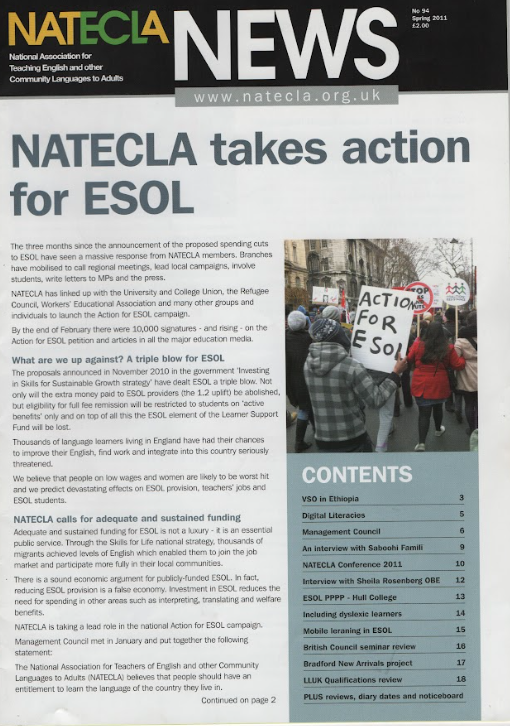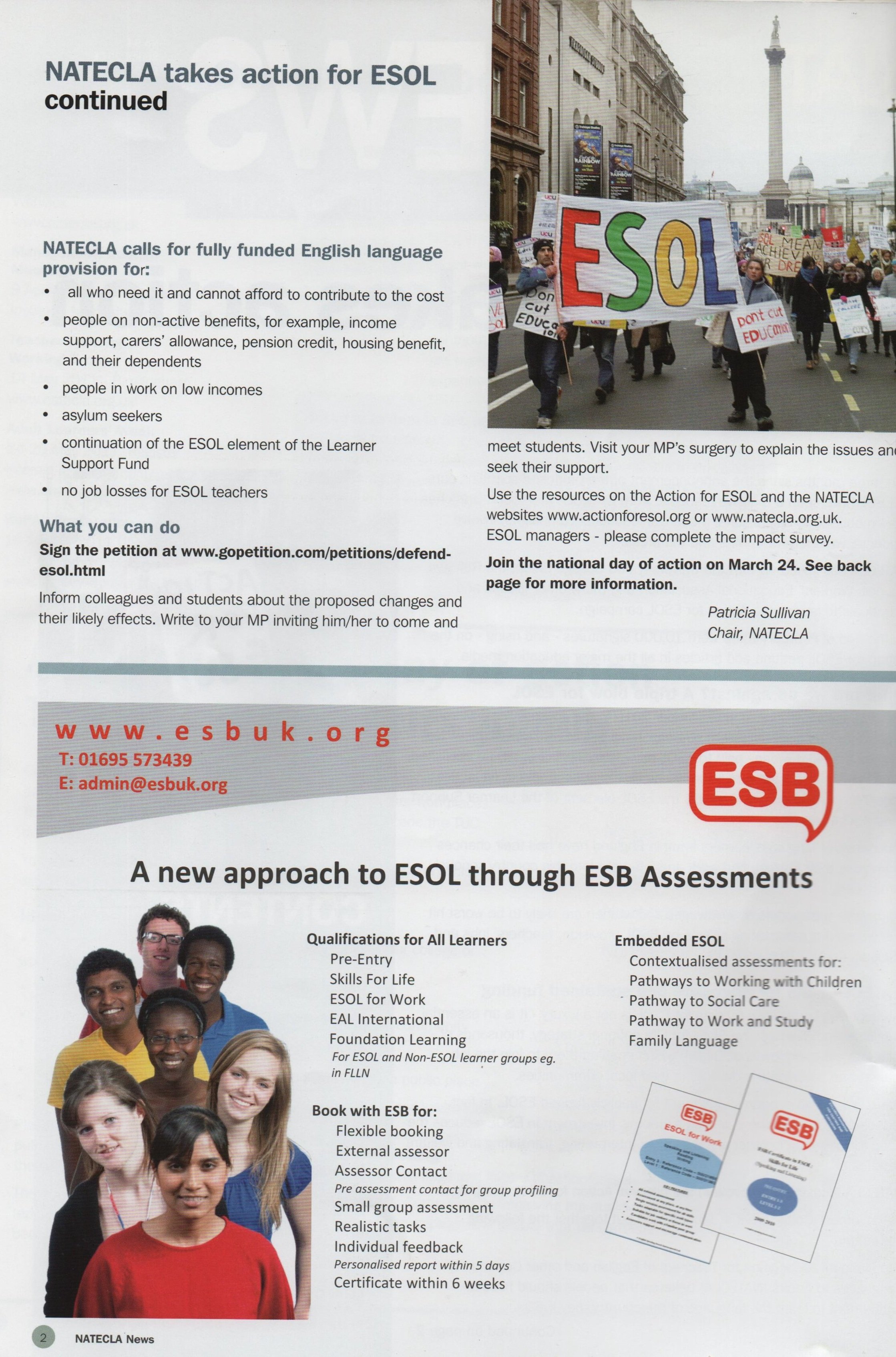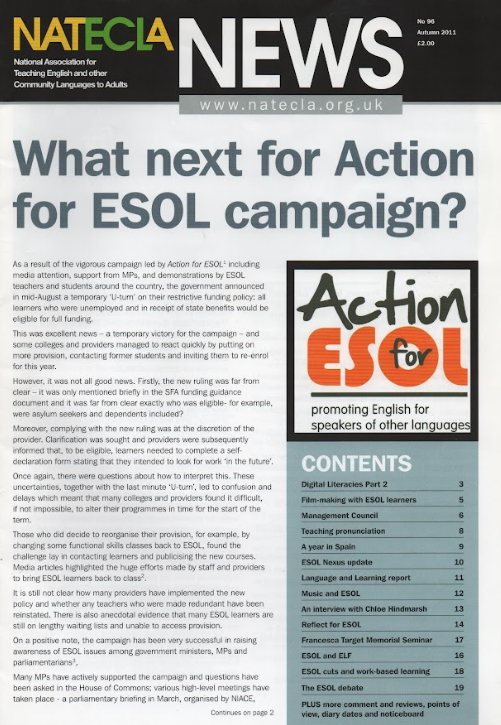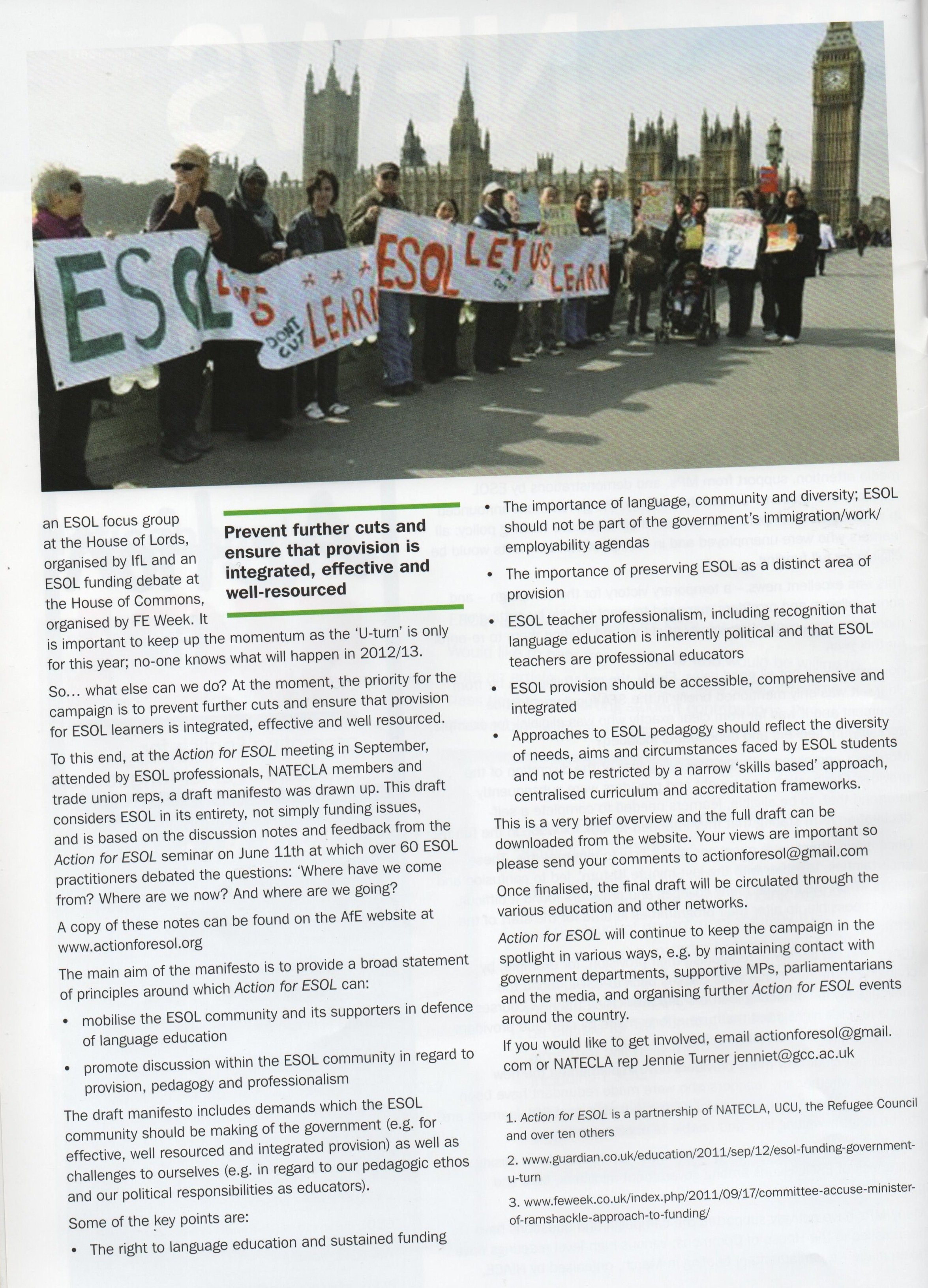
The ESOL Strategy
NATECLA believes that a national strategy is essential to achieve stability for ESOL provision to thrive. It will benefit both the learners and our wider society for decades to come.
Since 2016 we have been campaigning with partners towards this goal. Follow the timeline below to learn the context of NATECLA’s campaign for an ESOL strategy for England.
2001 Launch of the Skills for Life (SfL) strategy for literacy, numeracy and ESOL
This initiative radically altered the landscape of ESOL.
It produced:
The Adult ESOL Core Curriculum
ESOL teaching materials
Qualifications framework for learners
Qualifications for ESOL teachers.
The Adult ESOL Core Curriculum - this is the basis for the subject specifications which the Skills for Life ESOL qualifications still in use today.
ESOL teaching materials - these are still much-used.
Both the above can be found on a learning platform developed by the Education and Training Foundation.
Under the Skills for Life Strategy ESOL classes were free for all learners. ESOL tutors were required to take a Level 5 Additional Diploma qualification after their Diploma in Education and Training (DET).
Funding eventually ran out. Charges were introduced for ESOL classes.
2010-11 Action for ESOL campaign
resulting in the publication of ESOL Manifesto (2012).




2014 On speaking terms – government commissioned report
The report, ‘Making ESOL policy work better for migrants and wider society’ recommends a national strategy for ESOL.
The draft strategy contains details of NATECLA's national consultation on proposals for a strategy, our vision, background to ESOL in England. In addition, references other reports and articles related to a national ESOL strategy.
2016 NATECLA launches its campaign for an ESOL Strategy for England
By 2015 there had been calls from various agencies and organisations for a strategy for ESOL in England. NATECLA formed a steering group with representatives from across the sector to produce a draft strategy.
This involved a consultation with the sector and resulted in hundreds of responses. The document was launched at Westminster in Oct 2016, Key speakers included: Dr Sue Pember CBE- former (Director of Skills for Life Strategy, Director of HOLEX, the lead body for Adult and Community Education) Heidi Alexander MP, Chi Onwurah MP.
2017 NATECLA holds a second meeting to review progress one year on from the launch of the campaign.
For this meeting, again at Westminster, the steering group produced a report ‘Towards an ESOL strategy, How far have we got?’ link/visual of cover. The meeting was attended by ESOL stakeholders from Wales, Scotland as well as England. Key speakers included: Dr James Simpson, University of Leeds, Alex Stevenson, Learning and Work Institute, Dr Phillida Schellekens . The meeting was attended by several MPs and addressed by Gordon Marston Shadow Minister for Further Education
“The work NATECLA has done is groundbreaking. In the absence of any lead by Government they have drafted a way forward. They have persevered and continued to push the need. Well done to them.”
- Dr Sue Pember CBE- former Director of Skills for Life Strategy, Director of HOLEX, the lead body for Adult and Community Education.
In the press
FE News piece by Keith Hatch, 20th October 2016 'Trade unions have a role in supporting ESOL'
EL Gazette piece by Melanie Butler, October 2016 'UK missing an ESOL strategy'
TES article by Stephen Exley as part of ESOL special in the publication, 7th October 2016, 'Give asylum seekers free ESOL classes, say teachers'
TES 4 page special edition on ESOL (hard copy edition of the magazine only), 7th October 2016.
TES article by Jenny Roden (National Co-chair for NATECLA), January 2016, 'We need to pull together for a national Esol strategy' – full access for subscribers only
TES article by Sue Pember, Director of policy and external relationships at Holex, December 2015, 'Opinion: ‘Why England is crying out for a national Esol policy’
Piece in FE Week supplement, Reading between the Lines by Dr Nick Saville, Director of Research and Thought Leadership at Cambridge English, 'Making a strong case for ESOL investment' [^] (page 7 of supplement)
FE News article by Rob Peutrell, NATECLA committee member, founder member of Tutor Voices and an ESOL teacher in Nottingham, October 2015, 'Defend ESOL'
Blog article on NIACE website by Alex Stevenson,19 August 2014, 'New report on improving ESOL provision making headlines'
TES article by Alan Tuckett (President of the International Council for Adult Education), October 2014, 'A vital conversation everyone should join'
2018 Integrated Communities Strategy pledges a stand-alone ESOL Strategy to be published in Autumn 2019
Publication of the Action Plan (see chapter 4) is followed by consultation events with ESOL stakeholders. However, the promised strategy does not appear.
2022 The Lifelong Education Commission' published a significant ESOL report called 'ESOL for Skills'
“The government has re-engaged on its pledge to publish an ESOL strategy for England in Autumn 2019. However, the experience has taught us that the collective voice of the ESOL community is strong and bottom-up campaigning can be effective. I have no doubt that NATECLA’s independent charitable status, together with the commitment and energy of its members, place it in a unique position to make an impact on the ESOL landscape in the future.”
- Jenny Roden National Co-Chair 2015-18
National Association for Teaching English and Community Languages to Adults.








